- Home
- Robert E. Howard
The Savage Tales of Solomon Kane Page 24
The Savage Tales of Solomon Kane Read online
Page 24
It was a realm of the dead where was but one sign of life. Solomon Kane leaned on his blood-clotted ax and gazed upon the scene with dull, mad eyes. He was grimed and clotted with half-dried blood from long gashes on chest, face and shoulders, but he paid no heed to his hurts.
The people of Bogonda had not died alone. Seventeen harpies lay among the bones. Six of these Kane had slain. The rest had fallen before the frantic dying desperation of the black people. But it was poor toll to take in return. Of the four-hundred-odd people of Upper Bogonda, not one had lived to see the dawn. And the harpies were gone – back to their caves in the black hills, gorged to repletion.
With slow, mechanical steps Kane went about gathering up his weapons. He found his sword, dirk, pistols and the ju-ju stave. He left the main village and went up the slope to the great hut of Goru. And there he halted, stung by a new horror. The ghastly humor of the harpies had prompted a delicious jest. Above the hut door stared the severed head of Goru. The fat cheeks were shrunken, the lips lolled in an aspect of horrified idiocy, and the eyes stared like a hurt child. And in those dead eyes Kane saw wonder and reproach.
Kane looked at the shambles that had been Bogonda, and he looked at the death mask of Goru. And he lifted his clenched fists above his head, and with glaring eyes raised and writhing lips flecked with froth, he cursed the sky and the earth and the spheres above and below. He cursed the cold stars, the blazing sun, the mocking moon and the whisper of the wind. He cursed all fates and destinies, all that he had loved or hated, the silent cities beneath the seas, the past ages and the future eons. In one soul-shaking burst of blasphemy he cursed the gods and devils who make mankind their sport, and he cursed Man who lives blindly on and blindly offers his back to the iron-hoofed feet of his gods.
Then as breath failed he halted, panting. From the lower reaches sounded the deep roaring of a lion and into the eyes of Solomon Kane came a crafty gleam. He stood long, as one frozen, and out of his madness grew a desperate plan. And he silently recanted his blasphemy, for if the brazen-hoofed gods made Man for their sport and plaything, they also gave him a brain that holds craft and cruelty greater than any other living thing.
“There you shall bide,” said Solomon Kane to the head of Goru. “The sun will wither you and the cold dews of night will shrivel you. But I will keep the kites from you and your eyes shall see the fall of your slayers. Aye, I could not save the people of Bogonda, but by the God of my race, I can avenge them. Man is the sport and sustenance of titanic beings of Night and Horror whose giant wings hover ever above him. But even evil things may come to an end – and watch ye, Goru.”
In the days that followed Kane labored mightily, beginning with the first gray light of dawn and toiling on past sunset, into the white moonlight till he fell and slept the sleep of utter exhaustion. He snatched food as he worked and he gave his wounds absolutely no heed, scarcely being aware that they healed of themselves. He went down into the lower levels and cut bamboo, great stacks of long, tough stalks. He cut thick branches of trees, and tough vines to serve as ropes. And with this material he reinforced the walls and roof of Goru's hut. He set the bamboos deep in the earth, hard against the wall, and interwove and twined them, binding them fast with the vines that were pliant and tough as cords. The long branches he made fast along the thatch, binding them close together. When he had finished, an elephant could scarcely have burst through the walls.
The lions had come into the plateau in great quantities and the herds of little pigs dwindled fast. Those the lions spared, Kane slew, and tossed to the jackals. This racked Kane's heart, for he was a kindly man and this wholesale slaughter, even of pigs who would fall prey to hunting beasts anyhow, grieved him. But it was part of his plan of vengeance and he steeled his heart.
The days stretched into weeks. Kane toiled by day and by night, and between his stints he talked to the shriveled, mummied head of Goru, whose eyes, strangely enough, did not change in the blaze of the sun or the haunt of the moon, but retained their life-like expression. When the memory of those lunacy-haunted days had become only a vague nightmare, Kane wondered if, as it had seemed to him, Goru's dried lips had moved in answer, speaking strange and mysterious things.
Kane saw the akaanas wheeling against the sky at a distance, but they did not come near, even when he slept in the great hut, pistols at hand. They feared his power to deal death with smoke and thunder. At first he noted that they flew sluggishly, gorged with the flesh they had eaten on that red night, and the bodies they had borne to their caves. But as the weeks passed they appeared leaner and leaner and ranged far afield in search of food. And Kane laughed, deeply and madly. This plan of his would never have worked before, but now there were no humans to fill the bellies of the harpy-folk. And there were no more pigs. In all the plateau there were no creatures for the bat-people to eat. Why they did not range east of the hills, Kane thought he knew. That must be a region of thick jungle like the country to the west. He saw them fly into the grassland for antelopes and he saw the lions take toll of them. After all, the akaanas were weak beings among the hunters, strong enough only to slay pigs and deer – and humans.
At last they began to soar close to him at night and he saw their greedy eyes glaring at him through the gloom. He judged the time was ripe. Huge buffaloes, too big and ferocious for the bat-people to slay, had strayed up into the plateau to ravage the deserted fields of the dead black people. Kane cut one of these out of the herd and drove him, with shouts and volleys of stones, to the hut of Goru. It was a tedious, dangerous task, and time and again Kane barely escaped the surly bull's sudden charges, but persevered and at last shot the beast before the hut.
A strong west wind was blowing and Kane flung handfuls of blood into the air for the scent to waft to the harpies in the hills. He cut the bull to pieces and carried its quarters into the hut, then managed to drag the huge trunk itself inside. Then he retired into the thick trees near by and waited.
He had not long to wait. The morning air filled suddenly with the beat of many wings and a hideous flock alighted before the hut of Goru. All of the beasts – or men – seemed to be there, and Kane gazed in wonder at the tall, strange creatures, so like to humanity and yet so unlike – the veritable demons of priestly legend. They folded their wings like cloaks about them as they walked upright and they talked to one another in a strident crackling voice that had nothing of the human in it. No, these things were not men, Kane decided. They were the materialization of some ghastly jest of Nature – some travesty of the world's infancy when Creation was an experiment. Perhaps they were the offspring of a forbidden and obscene mating of man and beast; more likely they were a freakish offshoot on the branch of evolution – for Kane had long ago dimly sensed a truth in the heretical theories of the ancient philosophers, that Man is but a higher beast. And if Nature made man y strange beasts in the past ages, why should she not have experimented with monstrous forms of mankind? Surely Man as Kane knew him was not the first of his breed to walk the earth, nor yet to be the last.
Now the harpies hesitated, with their natural distrust for a building, and some soared to the roof and tore at the thatch. But Kane had builded well. They returned to earth and at last, driven beyond endurance by the smell of raw blood and the sight of the flesh within, one of them ventured inside. In an instant all were crowded into the great hut, tearing ravenously at the meat, and when the last one was within, Kane reached out a hand and jerked a long vine which tripped the catch that held the door he had built. It fell with a crash and the bar he had fashioned dropped into place. That door would hold against the charge of a wild bull.
Kane came from his covert and scanned the sky. Some hundred and forty harpies had entered the hut. He saw no more winging through the skies, and believed it safe to suppose he had the whole flock trapped. Then with a cruel, brooding smile, Kane struck flint and steel to a pile of dead leaves next the wall. Within sounded an uneasy mumbling as the creatures realized that they were prisoners. A thin
wisp of smoke curled upward and a flicker of red followed it; the whole heap burst into flame and the dry bamboo caught.
A few moments later the whole side of the wall was ablaze. The fiends inside scented the smoke and grew restless. Kane heard them cackling wildly and clawing at the walls. He grinned savagely, bleakly and without mirth. Now a veer of the wind drove the flames around the wall and up over the thatch – with a roar the whole hut caught and leaped into flame. From within sounded a fearful pandemonium. Kane heard bodies crash against the walls, which shook to the impact but held. The horrid screams were music to his soul, and brandishing his arms, he answered them with screams of fearful, soul-shaking laughter. The cataclysm of horror rose unbearably, paling the tumult of the flames. Then it dwindled to a medley of strangled gibbering and gasps as the flames ate in and the smoke thickened. An intolerable scent of burning flesh pervaded the atmosphere, and had there been room in Kane's brain for aught else than insane triumph, he would have shuddered to realize that the scent was of that nausea ting and indescribable odor that only human flesh emits when burning.
From the thick cloud of smoke Kane saw a mowing, gibbering thing emerge through the shredding roof and flap slowly and agonizingly upward on fearfully burned wings. Calmly he aimed and fired, and the scorched and blinded thing tumbled back into the flaming mass just as the walls crashed in. To Kane it seemed that Goru's crumbling face, vanishing in the smoke, split suddenly in a wide grin and a sudden shout of exultant human laughter mingled eerily in the roar of the flames. But the smoke and an insane brain play queer tricks.
Kane stood with the ju-ju stave in one hand and the smoking pistol in the other, above the smoldering ruins that hid forever from the sight of man the last of those terrible, semi-human monsters whom another white-skinned hero had banished from Europe in an unknown age. Kane stood, an unconscious statue of triumph – the ancient empires fall, the dark-skinned peoples fade and even the demons of antiquity gasp their last, but over all stands the Aryan barbarian, white-skinned, cold-eyed, dominant, the supreme fighting man of the earth, whether he be clad in wolf-hide and horned helmet, or boots and doublet – whether he bear in his hand battle-ax or rapier – whether he be called Dorian, Saxon or Englishman – whether his name be Jason, Hengist or Solomon Kane.
Kane stood and the smoke curled upward into the morning sky, the roaring of foraging lions shook the plateau, and slowly, like light breaking through mists, sanity returned to him.
“The light of God's morning enters even into dark and lonesome lands,” said Solomon Kane somberly. “Evil rules in the waste lands of the earth, but even evil may come to an end. Dawn follows midnight and even in this lost land the shadows shrink. Strange are Thy ways, oh God of my people, and who am I to question Thy wisdom? My feet have fallen in evil ways but Thou hast brought me forth scatheless and hast made me a scourge for the Powers of Evil. Over the souls of men spread the condor wings of colossal monsters and all manner of evil things prey upon the heart and soul and body of Man. Yet it may be in some far day the shadows shall fade and the Prince of Darkness be chained forever in his hell. And till then mankind can but stand up stoutly to the monsters in his own heart and without, and with the aid of God he may yet triumph.”
And Solomon Kane looked up into the silent hills and felt the silent call of the hills and the unguessed distances beyond; and Solomon Kane shifted his belt, took his staff firmly in his hand and turned his face eastward.
The Footfalls Within
The Footfalls Within
Solomon Kane gazed somberly at the black woman who lay dead at his feet. Little more than a girl she was, but her wasted limbs and staring eyes showed that she had suffered much before death brought her merciful relief. Kane noted the chain galls on her limbs, the deep crisscrossed scars on her back, the mark of the yoke on her neck. His cold eyes deepened strangely, showing chill glints and lights like clouds passing across depths of ice.
“Even into this lonesome land they come,” he muttered. “I had not thought –”
He raised his head and gazed eastward. Black dots against the blue wheeled and circled.
“The kites mark their trail,” muttered the tall Englishman. “Destruction goeth before them and death followeth after. Wo unto ye, sons of iniquity, for the wrath of God is upon ye. The cords be loosed on the iron necks of the hounds of hate and the bow of vengeance is strung. Ye are proud-stomached and strong, and the people cry out beneath your feet, but retribution cometh in the blackness of midnight and the redness of dawn.”
He shifted the belt that held his heavy pistols and the keen dirk, instinctively touched the long rapier at his hip, and went stealthily but swiftly eastward. A cruel anger burned in his deep eyes like blue volcanic fires burning beneath leagues of ice, and the hand that gripped his long, cat-headed stave hardened into iron.
After some hours of steady striding, he came within hearing of the slave train that wound its laborious way through the jungle. The piteous cries of the slaves, the shouts and curses of the drivers, and the cracking of the whips came plainly to his ears. Another hour brought him even with them, and gliding along through the jungle parallel to the trail taken by the slavers, he spied upon them safely. Kane had fought Indians in Darien and had learned much of their woodcraft.
More than a hundred blacks, young men and women, staggered along the trail, stark naked and made fast together by cruel yoke-like affairs of wood. These yokes, rough and heavy, fitted over their necks and linked them together, two by two. The yokes were in turn fettered together, making one long chain. Of the drivers there were fifteen Arabs and some seventy black warriors, whose weapons and fantastic apparel showed them to be of some eastern tribe – one of those tribes subjugated and made Moslems and allies by the conquering Arabs.
Five Arabs walked ahead of the train with some thirty of their warriors, and five brought up the rear with the rest of the black Moslems. The rest marched beside the staggering slaves, urging them along with shouts and curses and with long, cruel whips which brought spurts of blood at almost every blow. These slavers were fools as well as rogues, reflected Kane – not more than half of the slaves would survive the hardships of that trek to the coast. He wondered at the presence of these raiders, for this country lay far to the south of the districts usually frequented by the Moslems. But avarice can drive men far, as the Englishman knew. He had dealt with these gentry of old. Even as he watched, old scars burned in his back – scars made by Moslem whips in a Turkish galley. And deeper still burned Kane's unquenchable hate.
He followed, shadowing his foes like a ghost, and as he stole through the jungle, he racked his brain for a plan. How might he prevail against that horde? All the Arabs and many of the blacks were armed with guns – long, clumsy firelock affairs, it is true, but guns just the same, enough to awe any tribe of natives who might oppose them. Some carried in their wide girdles long, silver-chased pistols of more effective pattern – flintlocks of Moorish and Turkish make.
Kane followed like a brooding ghost and his rage and hatred ate into his soul like a canker. Each crack of the whips was like a blow on his own shoulders. The heat and cruelty of the tropics play queer tricks with white men. Ordinary passions become monstrous things; irritation turns to a berserker rage; anger flames into unexpected madness and men kill in a red mist of passion, and wonder, aghast, afterward.
The fury Solomon Kane felt would have been enough at any time and in any place to shake a man to his foundation; now it assumed monstrous proportions, so that Kane shivered as if with a chill, iron claws scratched at his brain and he saw the slaves and the slavers through a crimson mist. Yet he might not have put his hate-born insanity into action had it not been for a mishap.
One of the slaves, a slim young girl, suddenly faltered and slipped to the earth, dragging her yoke-mate with her. A tall, hook-nosed Arab yelled savagely and lashed her viciously. Her yoke-mate staggered partly up, but the girl remained prone, writhing weakly beneath the lash, but evidently unable to ris
e. She whimpered pitifully between her parched lips, and the other slavers came about, their whips descending on her quivering flesh in slashes of red agony.
A half-hour of rest and a little water would have revived her, but the Arabs had no time to spare. Solomon, biting his arm until his teeth met in the flesh as he fought for control, thanked God that the lashing had ceased and steeled himself for the swift flash of the dagger that would put the child beyond torment. But the Arabs were in a mood for sport. Since the girl would fetch them no profit on the market block, they would utilize her for their pleasure – and the humor of their breed is such as to turn men's blood to icy water.
A shout from the first whipper brought the rest crowding around, their bearded faces split in grins of delighted anticipation, while the black warriors edged nearer, their brutish eyes gleaming. The wretched slaves realized their masters' intentions and a chorus of pitiful cries rose from them.
Kane, sick with horror, realized, too, that the girl's was to be no easy death. He knew what the tall Moslem intended to do, as he stooped over her with a keen dagger such as the Arabs used for skinning game. Madness overcame the Englishman. He valued his own life little; he had risked it without thought for the sake of a negro baby or a small animal. Yet he would not have premeditatedly thrown away his one hope of succoring the wretches in the train. But he acted without conscious thought. A pistol was smoking in his hand and the tall butcher was down in the dust of the trail with his brains oozing out, before Kane realized what he had done.

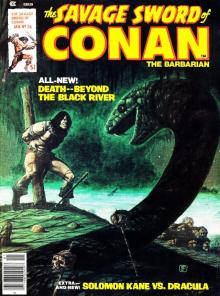 Beyond the Black River
Beyond the Black River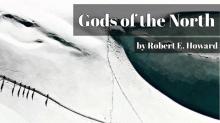 Gods of the North
Gods of the North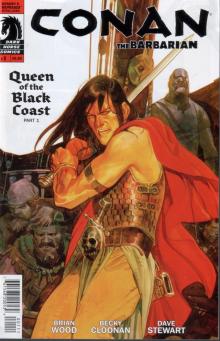 Queen of the Black Coast
Queen of the Black Coast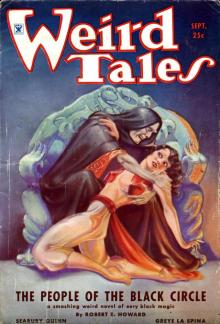 The People of the Black Circle
The People of the Black Circle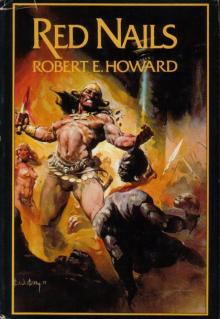 Red Nails
Red Nails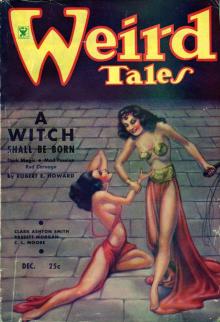 A Witch Shall Be Born
A Witch Shall Be Born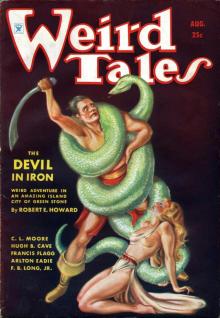 The Devil in Iron
The Devil in Iron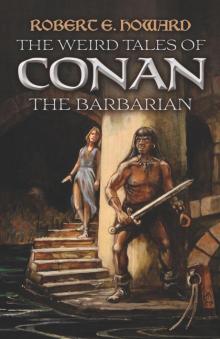 The Weird Tales of Conan the Barbarian
The Weird Tales of Conan the Barbarian The Bloody Crown of Conan
The Bloody Crown of Conan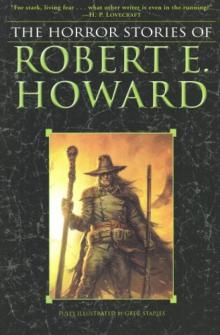 The Horror Stories of Robert E. Howard
The Horror Stories of Robert E. Howard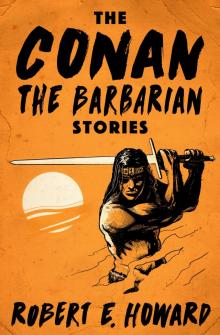 Conan the Conqueror
Conan the Conqueror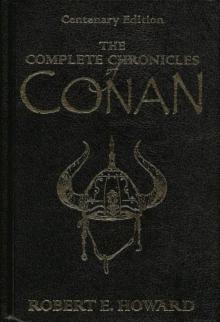 Conan the Barbarian
Conan the Barbarian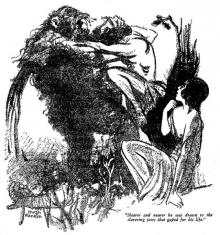 Shadows in the Moonlight
Shadows in the Moonlight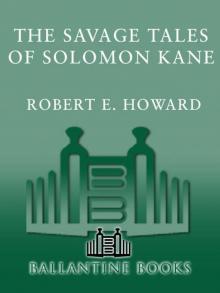 The Savage Tales of Solomon Kane
The Savage Tales of Solomon Kane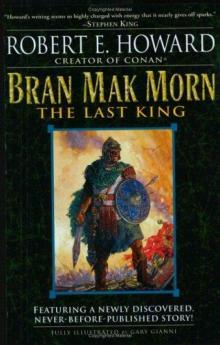 Bran Mak Morn: The Last King
Bran Mak Morn: The Last King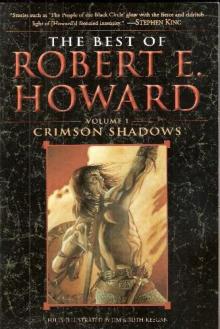 The Best of Robert E. Howard Volume One: Crimson Shadows
The Best of Robert E. Howard Volume One: Crimson Shadows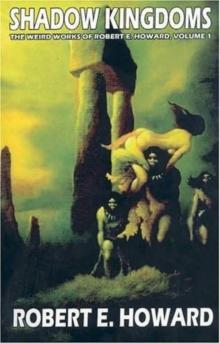 The Best of Robert E. Howard: Crimson Shadows (Volume 1)
The Best of Robert E. Howard: Crimson Shadows (Volume 1)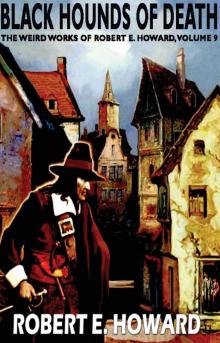 Black Hounds of Death
Black Hounds of Death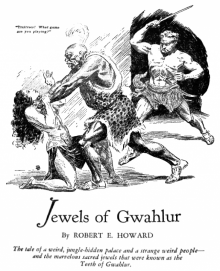 Jewels of Gwahlur
Jewels of Gwahlur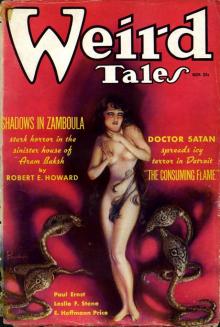 Shadows in Zamboula
Shadows in Zamboula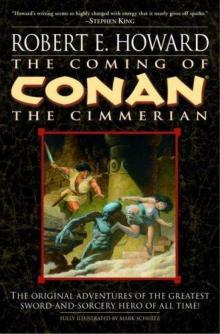 The Coming of Conan the Cimmerian
The Coming of Conan the Cimmerian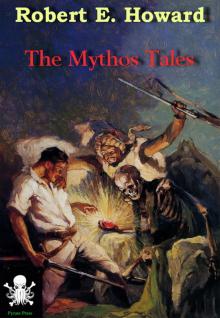 The Mythos Tales
The Mythos Tales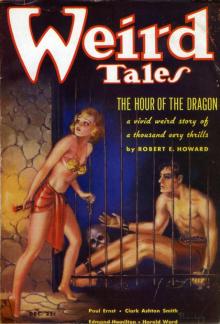 The Hour of the Dragon
The Hour of the Dragon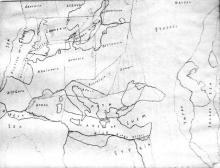 The Hyborian Age
The Hyborian Age El Borak and Other Desert Adventures
El Borak and Other Desert Adventures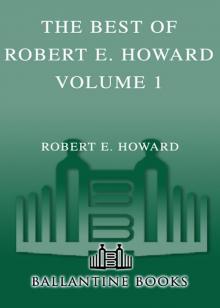 The Best of Robert E. Howard Volume 1 The Best of Robert E. Howard Volume 1
The Best of Robert E. Howard Volume 1 The Best of Robert E. Howard Volume 1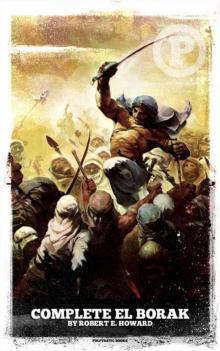 El Borak: The Complete Tales
El Borak: The Complete Tales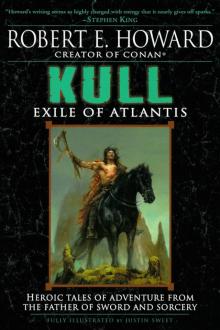 Kull: Exile of Atlantis
Kull: Exile of Atlantis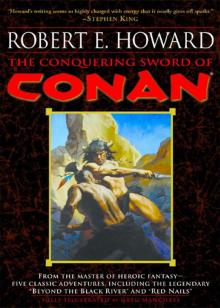 The Conquering Sword of Conan
The Conquering Sword of Conan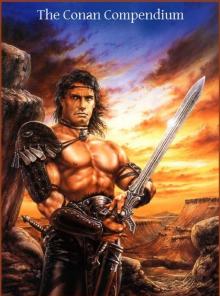 The Conan Compendium
The Conan Compendium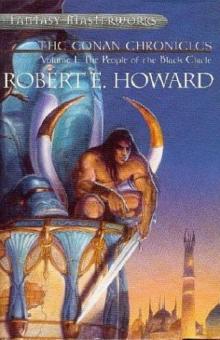 The Conan Chronicles: Volume 1: The People of the Black Circle
The Conan Chronicles: Volume 1: The People of the Black Circle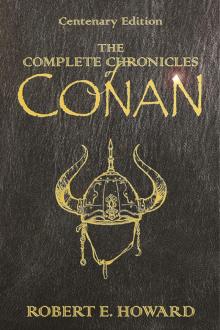 The Complete Chronicles of Conan: Centenary Edition
The Complete Chronicles of Conan: Centenary Edition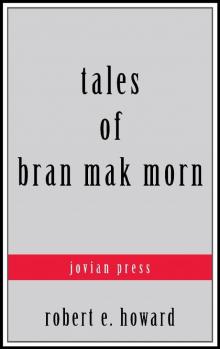 Tales of Bran Mak Morn (Serapis Classics)
Tales of Bran Mak Morn (Serapis Classics)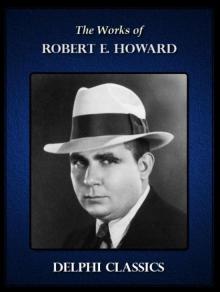 Delphi Works of Robert E. Howard (Illustrated) (Series Four)
Delphi Works of Robert E. Howard (Illustrated) (Series Four)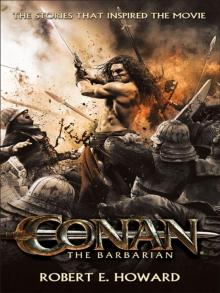 Conan the Barbarian: The Stories That Inspired the Movie
Conan the Barbarian: The Stories That Inspired the Movie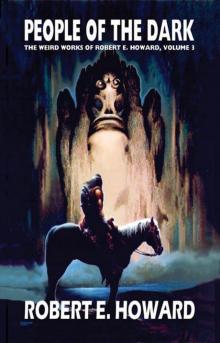 People of the Dark Robert Ervin Howard
People of the Dark Robert Ervin Howard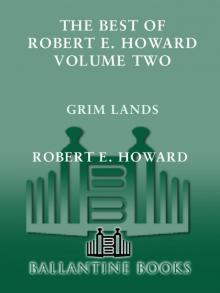 Grim Lands
Grim Lands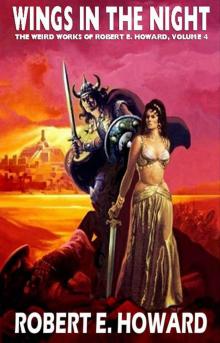 Wings in the Night
Wings in the Night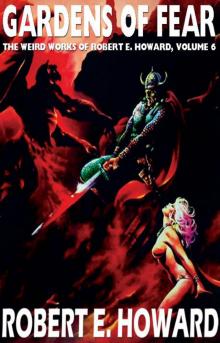 Gardens of Fear
Gardens of Fear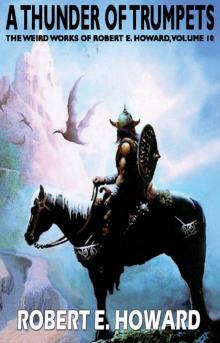 A Thunder of Trumpets
A Thunder of Trumpets Detective of the Occult
Detective of the Occult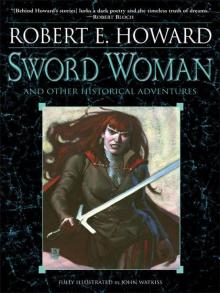 Sword Woman and Other Historical Adventures
Sword Woman and Other Historical Adventures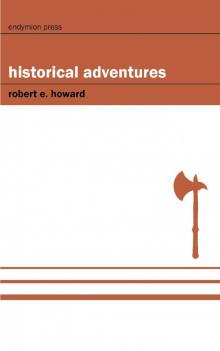 Historical Adventures
Historical Adventures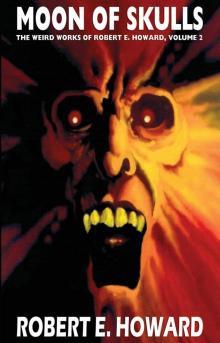 Moon of Skulls
Moon of Skulls The Robert E. Howard Omnibus: 97 Collected Stories
The Robert E. Howard Omnibus: 97 Collected Stories The Pirate Story Megapack: 25 Classic and Modern Tales
The Pirate Story Megapack: 25 Classic and Modern Tales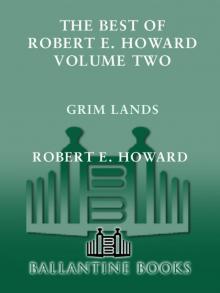 The Best of Robert E. Howard, Volume 2
The Best of Robert E. Howard, Volume 2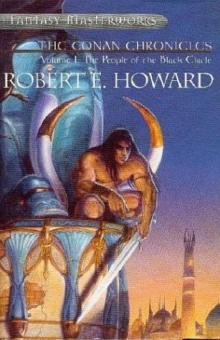 The Conan Chronicles, Vol. 1: The People of the Black Circle
The Conan Chronicles, Vol. 1: The People of the Black Circle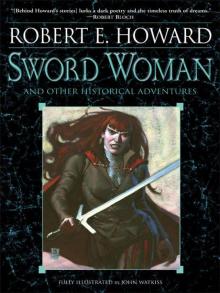 Sword Woman and Other Historical Adventures M
Sword Woman and Other Historical Adventures M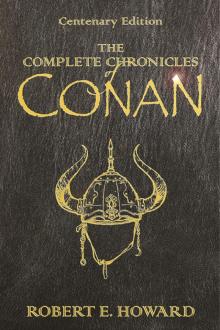 The Complete Chronicles of Conan
The Complete Chronicles of Conan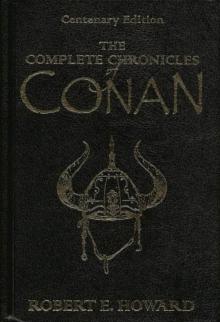 Conan the Barbarian: The Chronicles of Conan (collected short stories)
Conan the Barbarian: The Chronicles of Conan (collected short stories)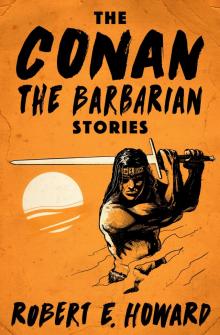 The Conan the Barbarian Stories
The Conan the Barbarian Stories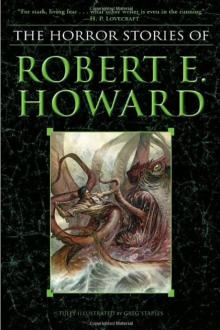 The Best Horror Stories of
The Best Horror Stories of Tigers Of The Sea cma-4
Tigers Of The Sea cma-4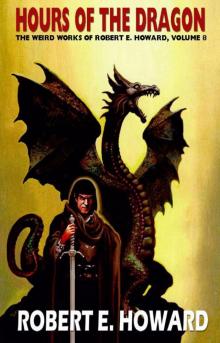 The Hours of the Dragon
The Hours of the Dragon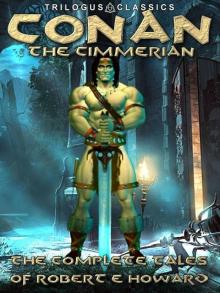 Conan the Cimmerian: The Complete Tales (Trilogus Classics)
Conan the Cimmerian: The Complete Tales (Trilogus Classics)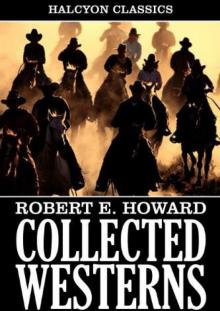 Collected Western Stories of Robert E. Howard (Unexpurgated Edition) (Halcyon Classics)
Collected Western Stories of Robert E. Howard (Unexpurgated Edition) (Halcyon Classics)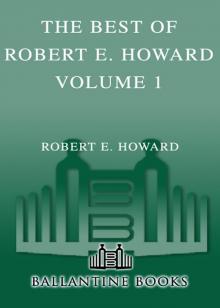 The Best of Robert E. Howard, Volume 1
The Best of Robert E. Howard, Volume 1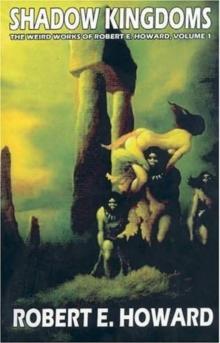 Shadow Kingdoms
Shadow Kingdoms